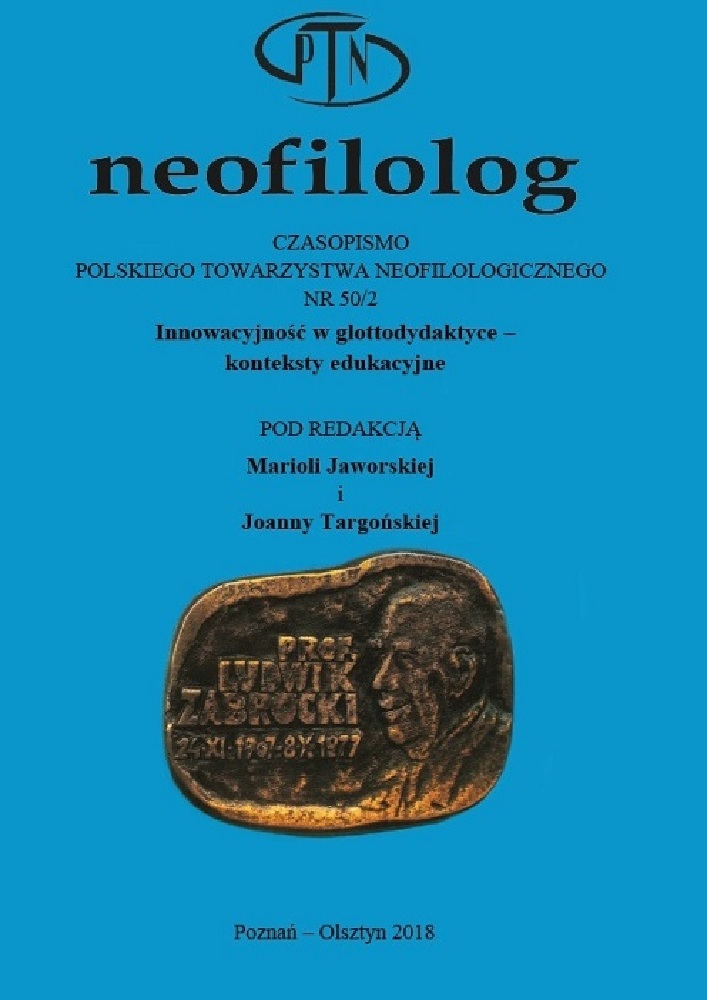Abstract
The following article presents the results of a survey in which teachers and students were asked to give their opinion on the German textbook Weltour or Meine Welttour. So far no alternative has been found for a textbook as a central medium of the lesson. This means, however, that both teachers and students assess its form and contents and see its strengths and weaknesses. The results of this unrepresentative study may be of interest to teachers, but above all to authors of language textbooks and publications. It is they who eventually decide on the final shape of such books, whose contents have not only to respect the requirements of the core curriculum, but also respond to students’ communication and intellectual needs.References
Bohnensteffen M. (2011), Englischlehrwerke und ihre unterrichtliche Verwendung – Ergebnisse einer nicht repräsentativen Befragung (w) „Fremdsprachen Lehren und Lernen”, nr 40/2, s. 120-133.
Börner O., Edelhoff Ch., Rebel K., Schmidt T., Schröder K. (2011), Funktion und Profil von Lehrwerken in der Epoche von Standards und Kompetenzen (w) „Fremdsprachen Lehren und Lernen”, nr 40/2, s. 31-48.
Jarząbek A.D. (2008), Jak nauczamy języków obcych w gimnazjach? Doniesienia z badań o wybranych aspektach autonomii nauczycielskiej (w) „Języki Obce w Szkole. O autonomii”, nr 6 (specjalny), s. 92-104.
Komorowska H. (2009), Metodyka nauczania języków obcych. Warszawa: Fraszka Edukacyjna.
Maijala M. (2007), Was ein Lehrwerk können muss – Thesen und Empfehlungen zu Potenzialen und Grenzen des Lehrwerks im Unterricht Deutsch als Fremdsprache (w) „Info DaF“, nr 34-6, s. 543-561.
Mróz-Dwornikowska S. (2014), Welttour 4. Podręcznik z repetytorium. Warszawa: Nowa Era.
Mróz-Dwornikowska S. (2015a), Meine Welttour 1. Warszawa: Nowa Era.
Mróz-Dwornikowska S. (2015b), Meine Welttour 2. Warszawa: Nowa Era.
Mróz-Dwornikowska S., Górecka U. (2012), Welttour 2. Warszawa: Nowa Era.
Mróz-Dwornikowska S., Szachowska K. (2013),Welttour 3. Warszawa: Nowa Era.
Neuner G. (1994), Lehrwerkforschung und Lehrwerkkritik (w) Kast B., Neuner G. (red.), Zur Analyse, Begutachtung und Entwicklung von Lehrwerken für den fremdsprachlichen Deutschunterricht. Berlin – München: Langenscheidt, s. 8-22.
Okoń W. (1973), Funkcje i treść podręcznika szkolnego (w) Parnowski T. (red.), Z warsztatu podręcznika szkolnego. Warszawa: PZWS, s. 72-79.
Pfeiffer W. (2001),Nauka języków obcych. Od praktyki do praktyki. Poznań: Wagors.
Rösler D., Würffel N. (2014), Lernmaterialien und Medien. München: Klett-Langenscheidt.
Rozporządzenie Ministra Edukacji Narodowej z dnia 27 sierpnia 2012 r. w sprawie podstawy programowej wychowania przedszkolnego oraz kształcenia ogólnego w poszczególnych typach szkół, Dz.U. 2012 poz.
Sadownik B. (2005), O ewaluacji materiałów glottodydaktycznych do nauczania języka niemieckiego jako obcego (w) „Przegląd Glottodydaktyczny”, nr 19, s. 5-12.
Skrzypczak J. (1996), Konstruowanie i ocena podręczników. Podstawowe problemy metodologiczne. Poznań – Radom: ITE.
Thaler E. (2011), Die Zukunft des Lehrwerks – Das Lehrwerk der Zukunft (w) „Fremdsprachen Lehren und Lernen”, nr 40/2, s. 15-30.
NETOGRAFIA
https://sjp.pwn.pl/szukaj/podr%C4%99cznik.html [DW 20.08.2017].
https://www.cke.edu.pl/images/_EGZAMIN_MATURALNY_OD_2015/Informacje_o_wynikach/2017/sprawozdanie/matura_sprawozdanie_2017_niemiecki.pdf [DW 20.08.2017].
License
Copyright (c) 2018 Alina Dorota Jarząbek

This work is licensed under a Creative Commons Attribution-NoDerivatives 4.0 International License.
Authors
Authors of texts accepted for publication in Neofilolog are required to complete, sign and return to the Editorial team’s office the Agreement for granting a royalty-free license to works with a commitment to grant a CC sub-license.
Under the agreement, the authors of the texts published in Neofilolog grant Adam Mickiewicz University in Poznań a non-exclusive, royalty-free license and authorize the use of Attribution-NoDerivatives 4.0 International (CC BY-ND 4.0) Creative Commons sub-license.
The authors retain the right to the free disposal of the work.
Users
Interested Internet users are entitled to use works that have been published in Neofilolog since 2017, under the following conditions:
▪ attribution – obligation to provide, together with the distributed work, information about the authorship, title, source (link to the original work, DOI) and the license itself.
▪ no derivatives – the work must be preserved in its original form. Without the author's consent, it is not possible to distribute the modified work in the form of translations, publications, etc.
Copyrights are reserved for all texts published since 2017.
Miscellaneous
Adam Mickiewicz University in Poznań retains the property right as a whole (layout, graphic form, title, cover design, logo etc.).
